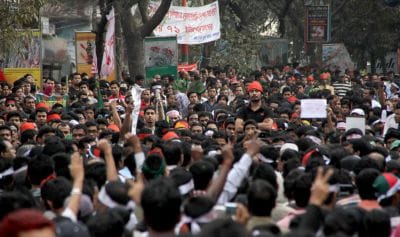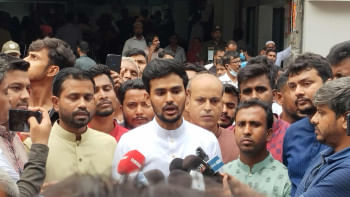<i>Projonmo chottor</i> shows the way

Photo: STAR
The call from the Shahbagh Projonmo Chattor reverberates throughout the length and breadth of the country, demanding capital punishment for the collaborators during the Liberation War. After 42 years the resurgent youth have rekindled the spirit and ethos of the Liberation War. Now, after a long and turbulent journey, light begins to show at the end of the tunnel.
After remaining in hibernation for five years since the liberation of the country, the demons who opposed the Liberation War and actively associated with the occupation forces in the brutalities raised their ugly heads and vitiated the social and political scene through their nefarious designs with the patronage of some self-seeking political masters. Two presidents who came from the barrack mutilated the constitution to suit their personal ends and in consequence the country suffered enormously for long 37 years.
People have not failed to notice that a storm had been brewing in the country not only on party lines but also on other fronts. Religion-based politics has no place in the present day world and it is contrary to the spirit of the Liberation War. Many people also think that the past governments had flip-flopped on major policy decisions allowing the divisive forces to gain ground. History teaches us that discarding reason and critical thinking in favour of fanaticism and extremist lines leads only to misery. Most of the activists who are now involved in Jamaat-e-Islami politics or outfits like Huji, etc., were not even born in 1971 and have no knowledge about the vile game these collaborators played in those genocidal days.
After 42 years, the youth have launched a peaceful protest movement demanding capital punishment for those perpetrators of crimes against humanity. These collaborators, calling themselves al Badr and al Shams and guided by Jamaat-e-Islami party, made a list of the intellectuals they wanted to eliminate from the soil of Bangladesh and gave it to the then High Command of the occupation forces in Dhaka. They reasoned that intellectuals were a major threat to the existence of Islam and Pakistan.
In carrying out their nefarious design of keeping the two wings together, they resorted to every possible means of violence like torture, rape, destruction and savagery of all sorts. Forty two years after those gory days, the hour of reckoning has arrived. Unhappily, the saga written in blood and enormous sacrifice has not been faithfully recorded. Sadly true, politics has since not gone beyond petty self-interest and narrow extremist party lines even at district and thana levels.
Even after the restoration of democracy in 1990, parties in power took little notice of the dangers of letting the extremist and radical religion-based political groups take control of things and ride roughshod over the principle of sacrifice and the spirit of the Liberation War. The AL vs BNP cum Jamaat feud and petty politicking stood in the way of establishing the rule of law and stopped all nation building activities based on the participation of all classes of people.
Even if the politicians, who remained mostly busy in fulfilling their narrow self-interest, failed to ignore the thunderheads piling high on the horizon, the youth could. They stood up like a rock to rid the country of the stigma and undo the damage wrought through long 42 years by allowing the collaborators and enemies of Bangladesh Liberation War to hold state power, fly national flag on their cars and amass vast wealth from home and abroad.
The portents were grim and the end result could have been more apocalyptic had not the youth forces come ahead and raised their voices through peaceful and non-violent means against the injustice and damage done to the nation through unholy compromise with the destructive forces. People witnessed that, at a time when the whole nation got united on the demand for death penalty for the war criminals, a group of Jamaat-Shibir activists unleashed a reign of terror in the streets of Dhaka and in different parts of the country by exploding cocktails, damaging vehicles, firing at police and injuring innocent people.
The Quranic principle and the teachings of the Holy Prophet (SM) enjoin upon the Muslims to practice tolerance even in the face of severest provocation, but now suddenly that perception of tolerance seems to have been shattered. People are wondering if those now campaigning for restoration of Islamic values want people to rediscover the virtues that were once needed in the days of the Prophet Muhammad (SM) when Islam faced the greatest assaults and stubborn resistance by the infidels.
Shockingly, the Prophet Muhammad's (SM) precepts as a code of earthly behaviour that galvanised Muslim societies with hope for renewal and growth are being lost sight of by the religious zealots. The whole world has reasons to be perfectly happy about the way medieval Europe crouched when Islam reached its apogee of power. Islamic culture and civilisation had worked wondrously, radiating brilliance and electrifying influence for over five centuries in the world. How can we forget the messages of Quran revealed in Medina that are so much tolerant of minority views and other faiths?
Today, in many places of our country, tolerant view and liberal attitude towards religion have given way to oppressive, illiberal and harsh measures, hitherto unknown in the earlier days of Islam. The campuses of some universities have become hostages to a section of activists belonging to radical group who have earned a bad name for Islam. Devout Muslims are shocked to hear that the name of their faith, which means “submission to Allah,†can summon up such images of violence.
Apart from the concern for lives and freedom that might be in jeopardy, moderates fear that this wave of terror unleashed by ultra-religious groups, with an innate passion to fulfill a lust for power, might destabilise the country. People in our country tend to forget that this region's mixed races with different faiths have to live together if they want to sustain a formidable growth rate.
The cause for which the youth of the country, apolitical in character and imbued with the spirit of Liberation War, have stood up is a national cause, a singular effort to rid the nation of an inglorious past and a dynamic endeavour to complete the unfinished task of the Liberation War. The mass awakening after 42 years initiated by a unique band of bloggers and net activists and immediately participated by the whole populace aims at fulfilling the dream of '71 through building a secular, non-communal, healthy and vibrant democratic society.
The writer is a Columnist for the The Daily Star.
E-mail: [email protected]

 For all latest news, follow The Daily Star's Google News channel.
For all latest news, follow The Daily Star's Google News channel. 



Comments